My Name is Leon: Characters (AQA GCSE English Literature): Revision Note
Exam code: 8702
My Name is Leon: Characters
Here you will find characters profiles for:
Main characters:
Leon
Carol
Maureen
Tufty
Sylvia
Mr Devlin
Other characters:
Jake
Zebra/Judy
Castro
Leon’s father
Jake’s father
Leon
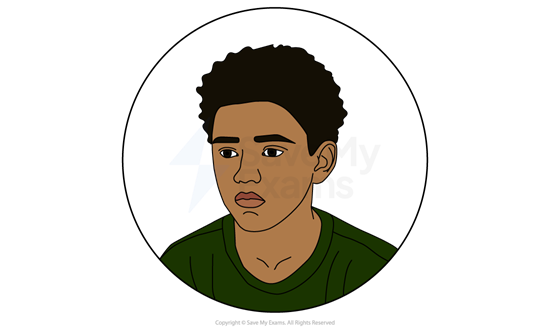
Leon is the titular character and the protagonist of the novel
Leon is eight years and nine months old when the story starts, and is 10 by the end
Leon lives in Birmingham, starting off in a flat with his mother, Carol, and baby brother Jake
He later lives with Maureen and then Sylvia, both in Birmingham
De Waal presents Leon as a calm, quiet and loyal young man who cares about others:
Amid chaos at home, and then in the care system, Leon retreats into himself
He is very observant, as he’s had to pay attention to his mother’s needs and moods:
Leon finds ways to eavesdrop on adults, as it is important to him to know what the adults around him are doing and thinking
This is a direct influence of the trauma of being a child who has to care for those who should be caring for him
De Waal presents a contrast between Leon’s precocious maturity that he has been forced to adopt and the immaturity that suits his age:
This is shown in how he reacts to what he overhears, especially when he thinks Maureen and Sylvia want to abandon him for the seaside and a dog
Maureen addresses this, telling Leon about the “danger” of “hearing half a conversation”
Leon struggles to understand how others feel and think:
As he has been raised in a situation where the dynamics were far from typical or appropriate, Leon fails to read situations in a typical manner
He does not trust adults:
This stems from his mum’s erratic behaviour
It is also the result of social services talking down to him and making decisions that affect him without consulting him or explaining them
De Waal may be making this choice to show that the way social services talk to and about him leads to Leon feeling detached from new people
Leon is also very vulnerable and insecure, although he does not realise it:
He pines for his mother and Jake
While he frames this desire as needing to look after them both, in reality he needs them to feel secure
He understands his mother’s issues, but just wants her to love him:
De Waal signifies this in their final moments together in the book
Leon tentatively asks if his mother still loves Jake, and she realises he is asking, without daring to, whether she loves him
He needs this affirmation that he never gets
This is further highlighted when he runs away from Maureen and Sylvia:
He reacts emotionally to believing neither love him, and is ready for them to abandon him like any others
He thinks he is independent, and that he just needs his family unit, but is deeply hurt by the idea they do not love him
He has grown to love them, especially Maureen
De Waal presents Leon as a character in conflict:
The situation with his mother is a constant struggle:
Leon tries to bring order into a chaotic home
His father left after Carol became pregnant with Jake, and Leon overhears that his father may be wanted by police
Then he is taken from his family by social services:
He wants to be with his brother, and is not given the choice
He feels his mother is also being kept from him
Leon is also a character of contrast:
He is big and tall, but emotionally vulnerable with instability at home
His mother and brother are white, but his father Black
He loves to garden, and care for his brother, showing his nurturing spirit, but loves games and TV with soldiers and weapons, and is fascinated by Mr Devlin’s weapons
We know him to be smart and good with numbers and letters, but he falls behind in school
At school, they are worried about him having no friends, yet he makes friends quickly with Tufty and Mr Devlin, as well as being loved by Maureen and Sylvia, who do not originally intend to have him long-term
He is outwardly well-behaved and polite, but steals
Leon often behaves well even when he doesn’t want to:
He is angry when Carol visits and wants to swear, but “has to swallow them down as usual”
Leon struggles with his identity:
He has very little knowledge of his family:
His mother is often ill
His father is absent
He only meets his grandmother once, before she dies the next day
He appears to have no knowledge of his Black identity, other than noticing similar patois between his father and Tufty
We see him retreat into himself, either desperate to watch TV, or get lost in fantasy:
In the second half of the novel, he is driven by the fantasy of reuniting his family and loses focus on anything else
He also has violent fantasies under stress from the likes social services
De Waal shows here that reality is too much for a young boy, so he dissociates to survive
Carol
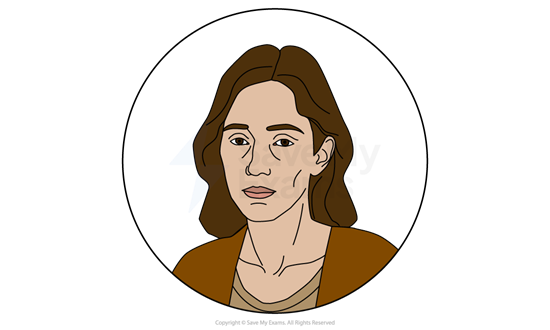
Carol is Leon and Jake’s mother
At the beginning of the novel it is implied she is 25 years old
As her mental health spirals, she is hospitalised and the boys taken into care
Later in the narrative, we find out she is in a halfway house in Bristol, which is close to two hours away
When the boys are taken into care, Carol doesn’t see Jake again, and sees Leon three times before the novel ends
Carol is clearly struggling with her mental health:
Initially, it appears to be postnatal depression
As the story continues, we learn that this is just one facet of her mental health issues
Carol’s character is revealed piece-by-piece as the narrative progresses:
Leon — as a naïve narrator — doesn’t always understand, but the reader, more mature and experienced, can pick up and infer
We learn from her file that Carol has problems with alcohol and substances:
Leon quickly ignores this
This may be de Waal signalling his immaturity in that he only thinks she is sick, and never responsible for any of her issues
We find out from her file that Carol makes no effort to attend any appointments once the boys are taken into care
It is clear from these notes that social services feel forced to place the children in care permanently
When these notes confirm that Carol has a “high level of self-interest”, this is no shock to the reader:
To this point in the narrative, Carol has seemed more interested in the men in her life than her own children
This is further supported by time she spends chasing Jake’s father while leaving the boys with Tina in Chapter 3
It is also reflected in her anger towards Leon — “if you hadn’t been sneaking around he would have come in” — when she notices him listening in on her conversation with Jake’s father at the door
Carol is not seen for a large part of the middle of the narrative, but when she comes back, she is a changed character:
Early on, she is vibrant when happy and erratic when sad
This then changes to a suffocating depression that sees her consigned to bed, wetting herself and leaving her children completely unattended
When we see her in care centres to meet with Leon, she seems a completely different person
In that first meeting, she is somewhat vacant and doesn’t notice when Leon enters the room to see her
Leon notices that she has lost a lot of weight, and looks like “she’s never been happy”
Carol is, whether by her own fault or not, quite selfish
Carol recognises that she cannot care for Leon, but does not seem to consider his feelings:
When she first tells him she cannot care for him, she also says she “can’t manage” herself
Later, we hear she hasn’t marked Leon’s birthday in any way
In chapter 41, the last time we see her, she again tells Leon she can’t care for him
She gets angry at Leon’s suggestion that she come live with Maureen to be looked after:
She does not mind passing off the responsibility for Leon’s care, but is riled by the idea people see her in a negative light
This may connect with the idea that Leon talks about her being pretty and attractive:
As someone who has been seen as pretty her whole life, she needs to uphold an image in her head of who people think she is:
This is more important than caring about the needs of others
This rubs off on Leon, who is proud of her beauty, and then feels embarrassed to be seen with Maureen later on:
Leon thinks Maureen and Sylvia are fat and ugly when he believes they are rejecting him
This reveals that he has taken on physical attractiveness as an important characteristic
The last thing we see of Carol is her at her best, and as Leon sees her:
“She gives a little curtsy like he’s a king and she’s a servant” before she leaves:
This is the mother that Leon sees throughout, a charismatic and beautiful character
It is also typical of her, to show such charm but, ultimately, to leave Leon alone
Maureen
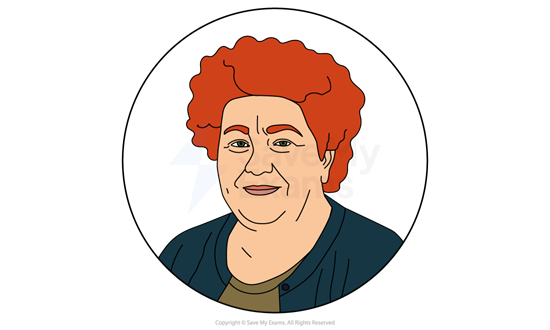
Maureen is an experienced foster parent who takes Leon and Jake in
Maureen is older than Carol:
Although her age isn’t specified, she has children and grandchildren of her own
When Maureen enters the story in Chapter 6, she is instantly warm and caring:
Leon is slightly taken aback by how affectionate she is to Jake
This can be seen in the confusion Leon feels when she kisses Jake, “even though she’d never met him before”
In many ways, Maureen is the opposite of Carol:
While Carol is seen as a beautiful, slim and young woman, Maureen is described by Leon as having “fuzzy” red hair, “arms like a boxer” and a “massive belly”
This is also represented in the differences in their homes:
With Carol, Leon is left hungry and caring for himself
Maureen’s home “smells of sweets and toast”, and Leon is surprised by the amount of food he is given to eat
This is also true in the way she talks about the children and her parenting:
Carol is selfish and thinks about her own needs
Maureen talks about how she never stops being a parent, even after her own and the foster children have moved out
The first physical description of Maureen mentions her hair being like “a flaming halo”:
This symbolism may be the author showing Maureen as an angel coming to the rescue
Maureen is principled and confident:
In the meeting with the social worker after Jake has been adopted, she makes it clear she is unhappy with the decision
She is also understanding and not ignorant of the fact that Jake is more likely to be adopted because he is white:
She is the first person to talk to Leon about race
She shows she is angry about the injustice, support Leon has not received before
She also scolds Carol for her behaviour in front of Leon:
This shows she is comfortable standing up for what she thinks is in his best interests
Maureen suffers a stroke halfway through the story:
This is another example of Leon experiencing loss and a feeling of abandonment
In the hospital, it becomes clear that Leon loves Maureen, and her affectionate nature is helping him
In Chapter 15, Leon is worried about touching her, in case she dies
By Chapter 19, he is worried by how she smells and sounds different, but is comforted that Maureen is the same when she hugs him:
This hug instantly cheers him up, and is something Leon has lacked a lot in his life — affection from an adult
When Maureen gets out of hospital and goes back to Sylvia’s, life seems to be getting back to a normal rhythm
Her importance to Leon is underlined by the fact that overhearing part of Maureen and Sylvia’s conversation, fantasising about a nice move to the coast, is so emotionally difficult for him:
This conversation sees Leon not only go looking for Jake and his mum, but also break down emotionally about his difficult life
He fears she is “just like everyone else”
Maureen is committed to Leon:
She wants to keep Leon permanently and shows determination to protect him, even if this means defying social services
When he is missing towards the conclusion of the novel, she waits up for him in a panic
She also doesn’t call social services, because she does not want them to take him away
Tufty
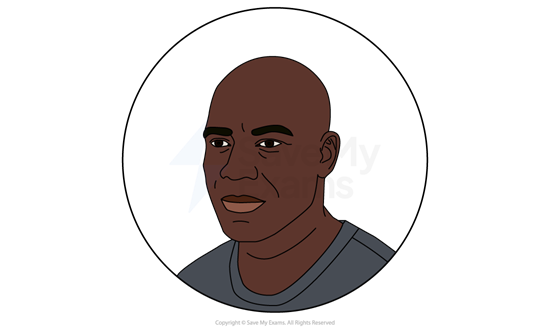
Tufty is a Black man with West Indian roots
He is also known as Mr Burrows and Linwood
Tufty comes into the story when Leon moves in with Sylvia:
Leon meets Tufty at the local allotment
He shows kindness to Leon instantly, helping him make his bike more comfortable and then showing him his gardening skills
This is important, as Leon is again feeling lost and abandoned, and Tufty is quickly warm and caring towards him
He is a present male role model for Leon, whose father is in prison:
Up until this point in the narrative, we see Leon without any Black role models
This emphasises Tufty’s importance
Another way de Waal uses Tufty is as a symbol of the importance of community:
For Leon, he has only ever cared about his mum, dad and brother:
This has left him somewhat isolated from other people
Tufty is the first sign of a friend we see Leon make
Suddenly, from a lonely life, Leon is building a new home, with loving care from Maureen and a sense of community at the allotment
Tufty is protective of Leon:
While his anger towards Mr Devlin is misplaced, it signifies someone fighting for Leon, unlike his prior family life
He then does so again during the riots, even after Leon has threatened both him and Mr Devlin:
This is another big moment for Leon, who has never known an adult in a difficult situation stand by him
Tufty’s inclusion in the book can be seen to represent the Windrush Generation:
Leon then meets his friends, who play dominoes together and are forthright with their political opinions
They openly discuss racism and the police’s discrimination of Black people
This is completely new to Leon and gives him a sense of belonging based on his race
Tufty and his friends also show a softer side to masculinity, with Tufty reading poetry for the group
Tufty becomes someone that Leon greatly looks up to:
Tufty’s skills in the allotment inspire Leon to join in
He is patient and kind, and does not treat Leon like a small child, which Leon respects
Tufty does not patronise him and bend the truth
Leon becomes very interested in gardening, wants to join a martial arts club because Tufty does it, and even repeats back Tufty’s poetry to others:
In this way, the author is showing us how Tufty is helping Leon to find his voice
He literally speaks Tufty’s poetry in a confrontation, but also begins to find confidence in his own thoughts and starts standing up for himself, even when it is misguided
The author uses Tufty’s influence in the allotments to be representative of the care that Leon should have had growing up:
Tufty guides Leon through the simpler, early steps of planting seeds, akin to a parent guiding him through his early years
He teaches him about the community, both the allotment and that relating to being a young Black man
He is protective of him over Mr Devlin, much like a parent might be
Sylvia
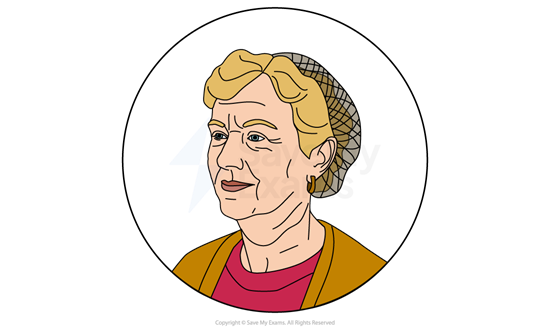
Sylvia is Maureen’s sister
We first meet Sylvia when Maureen and Leon go on an impromptu visit:
This is day is the first big sign we are given that Maureen is unwell
Leon goes to live with Sylvia while Maureen is in hospital:
This means that Leon is not forced to go to another foster carer’s home
Sylvia is different to her sister:
She is less outwardly soft
She has a more cynical view on life and more blunt honesty
A good example of this is the fact that Sylvia doesn’t celebrate her birthday, as it is just a tally of the years she’s lived
Unlike her sister, Sylvia has no children, and she works part-time at the supermarket
Sylvia’s outer exterior is harder than Maureen’s, but she is very protective of her sister:
This is seen when she takes in Leon, even though fostering is not something she is keen on
She takes in Leon when Maureen is ill because she understands Maureen doesn’t want Leon to be taken away
This is further illustrated by her telling Leon she is going to look after him until Maureen’s well again because Maureen “loves us both”
Sylvia has more of a social life than Maureen:
We see her with friends at her house on multiple occasions, including on Leon’s birthday
She is a key part of the local community’s planning for a street party to celebrate the Royal Wedding
She also goes on a date while Leon lives with her, and looks to have a romantic connection with Mr Devlin at the end of the novel
Sylvia not having experience as a parent changes the dynamic for Leon once again:
Leon is able to spend time at the allotments and pretend to Sylvia that he has made friends of his age at the park because Sylvia is not paying the same attention to Leon as Maureen would
But it also helps her form a bond with Leon:
By being more direct and honest with Leon, Leon gains respect for Sylvia, and enjoys not being spoken down to as a child as often
Her sense of humour also helps the bond form:
She makes some jokes and comments that might be inappropriate for a boy of Leon’s age, especially as she swears when talking to him
Frustrated by social workers and adults in his life talking to him like a child, Leon enjoys this change, and it makes him fonder of Sylvia
Mr Devlin
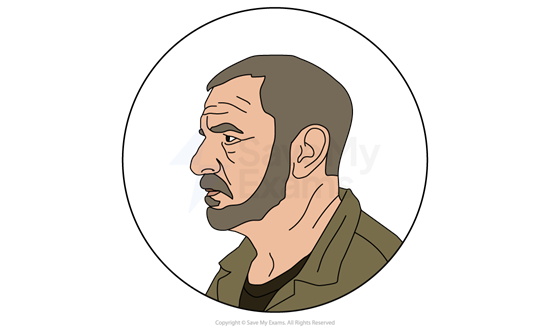
Mr Devlin is an Irishman who comes into the story in Chapter 17
He is older than Tufty, closer to Sylvia and Maureen’s age
Mr Devlin is a senior member of the committee that runs the allotments
When we first meet Mr Devlin, he seems to be oppositional to Tufty and Leon:
Later, he softens to Leon when they talk and then spend time alone
Mr Devlin is brought into the story by de Waal as another authority figure and role model for Leon as he finds community at the allotments
It can be argued that de Waal uses Tufty, Maureen, Sylvia and Mr Devlin to represent different aspects of parenting that Leon is now getting:
Mr Devlin treats Leon with respect and looks to teach him things, but is a stricter figure than the other three, and shows more anger
Like with Sylvia, it is some of the things about Mr Devlin that are less child-friendly which Leon appreciates:
The knives and weapons in his shed fascinate Leon
Kit de Waal is part Irish, and Mr Devlin represents her Irish parent, Irish people in England, and links to the Troubles, a key historical and social point for 1980s Birmingham and Britain:
He faces some discrimination, with Tufty insinuating that he is a terrorist, linking him to the IRA
Mr Devlin himself is prone to prejudice, making a racist statement back to Tufty in the same argument
Ireland has a long history of emigration
This is represented in Mr Devlin, who it is revealed lived in Brazil in the past
As Mr Devlin softens, we learn more about him:
We find out that he once lived in Brazil and went through family tragedies
He appears to have had a son who passed away, and he has carved a wooden doll of him, that he is attached to and speaks to:
When Leon takes the doll, Mr Devlin is devastated, and then incredibly angry when he finds out that Leon has it
He is also astounded that Leon would take something he didn’t need, feeling upset that he had shown affection to someone who then seems to betray him
It also appears that he helped look after many children when living in South America
It becomes apparent that Mr Devlin is struggling with his personal trauma:
He seems to drink heavily, which is likely used by the author to show that Mr Devlin is trying to dull his pain
When drinking, he is caught talking to himself about his pain:
In Chapter 31, he says aloud to himself, “I was loved. They loved me”, which shows him wistful about his past
It is possible he sees a part of his old life in his time with Leon, and wants to show him guidance like he would with his son
Leon regularly describes him in ways that suggest he isn’t looking after himself:
Leon notes that he wears the same clothes each day, talks about smelling whiskey on his breath, even suggesting he “might actually be a tramp”
This contrasts with how he looks at the end, once he starts spending time with Sylvia
Leon then describes him as “clean”, with new clothes, and even noting him “washing his hands in the water barrel by his shed before he comes to see Sylvia”
He is happy and starts to take care of himself
Other characters
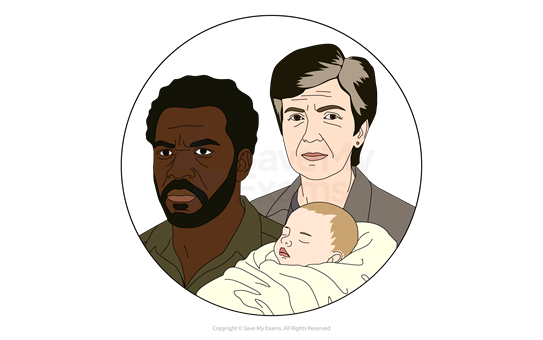
Jake
Jake is Leon’s baby brother, who was born on the day the story starts
He is taken into care with Leon when Carol can no longer look after them
He has a different father to Leon:
This man is married and wants nothing to do with him or Carol
Jake is white
He is adopted before his first birthday, and separated from Leon
Jake is Leon’s pride and joy:
With Carol neglectful of them both, Jake forms an attachment to Leon as a caregiver
Leon adores his little brother, thinking him perfect
Social services promise that Jake will write letters to Leon, but it takes Sylvia and Maureen hassling them consistently for even one letter to be written for Leon’s birthday:
De Waal could be using this as an important plot point to remind the reader how families separated by the care system are truly torn apart
Even a simple request like updates on his life can be ignored once the system splits them up, highlighting how the care system is happy once its obligation is fulfilled
Another important point of Jake’s character is to highlight the racial inequality within the system:
De Waal is direct with this point, having characters reiterate that Jake being white has a significant influence on him being adopted
Equally, it reminds us that adoption is more likely for younger children, especially babies, as adopting parents want to raise children as their own:
De Waal uses Jake as a symbol of what Leon isn’t and what that means for him
Leon’s fears that Jake will forget him are also unimportant to social services, which may be a comment on how the system forgets about the needs of older children
It could also be de Waal commenting on how the system dehumanises those caught up in it
Castro
Castro is one of Tufty’s friends whom Leon meets at the allotment
In their meetings together as a group, Castro is loud and vocal
Tufty and his friends are keen to bring about change for Black people, but have different ideas on how:
While the others call to lobby people in power, Castro calls for an army
None of the men disagree with Castro’s anger, but they don’t agree with violent protest
The irony here is that violent protests do start, but because Castro is killed in police custody
De Waal uses Castro and his fate to reference incidents of the 1980s, but also events that are still common now:
The 1980s were a time of much racial discrimination, and deaths of Black people in custody added fuel to eventual riots at the time
The Black Lives Matter movement in America has more recently highlighted discrimination and the mistreatment of Black people
We see that Castro has had problems with the police before:
He is known to the officers who come into the allotments
Leon is confronted by Castro later in the novel when he is on the run from the police for resisting arrest:
This could be de Waal highlighting how Black people have had to resist discrimination from the police, only to be labelled criminals for doing so
Although not central to Leon’s personal plotline, Castro’s story is crucial to the novel’s social commentary and the riot sequence:
As such, the character of Castro is another piece of commentary about the fate of Black people, particularly Black men, in the UK
Equally, this could be de Waal showing how these stories are happening all the time and are easily, and often, overlooked
Zebra
Zebra’s real name is Judy, but Leon names her Zebra because of her black-and-white hair
Of all the social workers in the story, Leon trusts Zebra the most
This appears true of Maureen, too:
She respects Zebra trying to do the work, even if she disagrees with the results
Zebra does make an effort to help, going out of her way to collect Carol in the early morning to ensure she makes it to a visit with Leon
She also sends Leon a birthday card
Giving her a nickname could be a way of the author indicating that these social workers come in and out of children’s lives:
They make meaningful things happen (adoptions) without forming any meaningful connection with the children
They can thus be seen as faceless entities rather than real people
Leon’s father
Leon’s father is a Black man with West Indian roots
His name is Byron Francis
He lived with Leon and Carol inconsistently
He ultimately left when he found out that Carol was pregnant with Jake by another man
Leon is positive about his dad, and treasures positive memories of him:
Leon remembers his father arguing with neighbours about a dangerous dog that he didn’t want near Leon
His father came to visit with Christmas presents one last time before he left for good
He also remembers hearing his father argue with his mother, and how he would repeat words and talk in “fast West Indian” patois when angry, but thinks nothing of it
Like with Carol, Leon’s naivety is apparent with his views and feelings towards his father
He fails to see the negative traits in either of them
Leon overhears social services talking to Maureen about Leon’s father:
They state that “when they catch up with him he won’t be seeing daylight for a long time”
This suggests that Leon’s father is on the run from police
Tufty and, to a lesser extent, Castro remind Leon of his dad:
Leon is desperate for the guidance of his father
De Waal places these two characters in to fill in as Leon’s Black male role models
Jake’s father
We learn very little about Jake’s father
He is a white man
He is married, and he has no interest in being part of Jake and Carol’s lives
He is insulting towards Carol:
This intimidates Leon
It doesn’t seem that Jake’s father has any involvement with social services after the boys are taken into care:
This could be a suggestion from the author that men are too easily allowed to wash their hands of responsibility for children
Sources
De Waal, K. (2016), My Name is Leon, Viking

Unlock more, it's free!
Was this revision note helpful?
